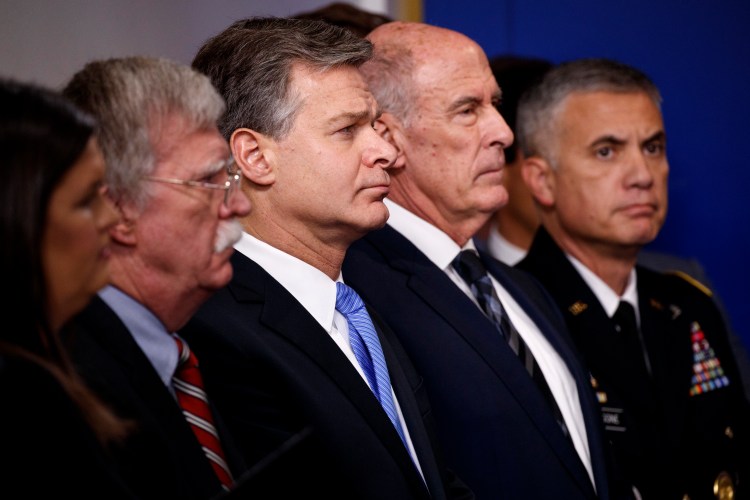Top national security officials made a rare appearance in the White House briefing room Thursday to warn that Russia continues to target U.S. elections and to outline what is being done to combat the interference.
“In regards to Russian involvement in the midterm elections, we continue to see a pervasive messaging campaign by Russia to try to weaken and divide the United States,” Director of National Intelligence Daniel Coats said. “We know there are others who have the capability and may be considering influence activities.”
The joint appearance by Coats, Secretary of Homeland Security Kirstjen Nielsen, national security adviser John Bolton, FBI Director Christopher A. Wray and National Security Agency Director Paul Nakasone comes as the administration is facing criticism over its efforts to deal with election interference and continuing questions over how seriously President Trump takes the threat.
Lawmakers and independent analysts say that U.S. voting systems are more secure against hackers, thanks to action at the federal and state levels — and that the Russians have not targeted those systems to the degree they did in 2016.
But Russian efforts to manipulate U.S. voters through misleading social media postings are likely to have grown more sophisticated and harder to detect, and there is not a sufficiently strong government strategy to combat information warfare against the United States, outside experts warn.
Thursday’s news conference was the first time that the heads of the intelligence and law enforcement agencies with a role in preventing election interference have appeared together to address the threat. Their joint appearance follows a meeting last week of the National Security Council on election security, the first Trump has led on the matter, which lasted less than an hour and produced no new orders on how to counter or deter the interference.
The agency leaders announced no new policies and in some instances did not directly answer questions about what particular guidance or orders they were given to counteract Russian moves.
The officials described Russian actions observed to date as significant but not as multifaceted as those that intelligence agencies saw during the 2016 campaign.
“We are not yet seeing the same kinds of efforts to specifically target election infrastructure” as in 2016, Wray said, referring to Russian penetration of voter rolls and other efforts to attack the machinery that collects and tabulates vote counts.
“What we are seeing are the malign influence operations,” he said, which has played out in propaganda efforts on social media that Wray called “information warfare.”
Coats said Russian activity in preparation for the midterms “is not the kind of robust campaign” that was undertaken two years ago.
Nakasone, who is also the newly installed commander of U.S. Cyber Command, which has the authority to attack and disable foreign computer networks, was asked what orders he had been given to counteract Russian interference. Nakasone did not answer that question directly. “We’re not going to accept meddling in the elections,” he said.
Hours earlier, a bipartisan group of senators unveiled legislation that would impose aggressive new sanctions on Russia. The move represents the latest attempt by lawmakers to push congressional leaders to intensify punitive measures against would-be election hackers and symbolizes their growing frustration with the White House, which has sent mixed messages on Russia’s attempts to manipulate the American electorate and so far has declined to fully implement sanctions already available to the administration.
Karoun Demirjian, Ellen Nakashima and Craig Timberg contributed to this report.
Send questions/comments to the editors.



Success. Please wait for the page to reload. If the page does not reload within 5 seconds, please refresh the page.
Enter your email and password to access comments.
Hi, to comment on stories you must . This profile is in addition to your subscription and website login.
Already have a commenting profile? .
Invalid username/password.
Please check your email to confirm and complete your registration.
Only subscribers are eligible to post comments. Please subscribe or login first for digital access. Here’s why.
Use the form below to reset your password. When you've submitted your account email, we will send an email with a reset code.